Nestled amidst the serene hills near Pune, Anant Farms beams as a haven of sustainability intertwined with rich cultural heritage. Here, Anirudha Ambekar and his wife Sucheta, have curated a lifestyle that embodies the essence of mindful living.
Anirudha and Sucheta, both IT professionals, began their careers in the bustling tech hub of Bengaluru before settling in Pune. Despite their urban lifestyle, the call of their rural roots remained strong.
Childhood memories of Bramhanghar in Marathwada, a quaint village where Anirudha grew up, lingered in his heart — the large stone house, wooden doors, and the simple joys of village life.
“It was a small village, and we lived in an old house with walls made of stone and large wooden doors. We lived as a joint family and practised farming. We even had a cow in the backyard. Growing up in such a setup, I deeply missed it when I moved out. I missed living in a bigger house, having access to farm produce, and the typical joys of going on a picnic,” he reminisces.
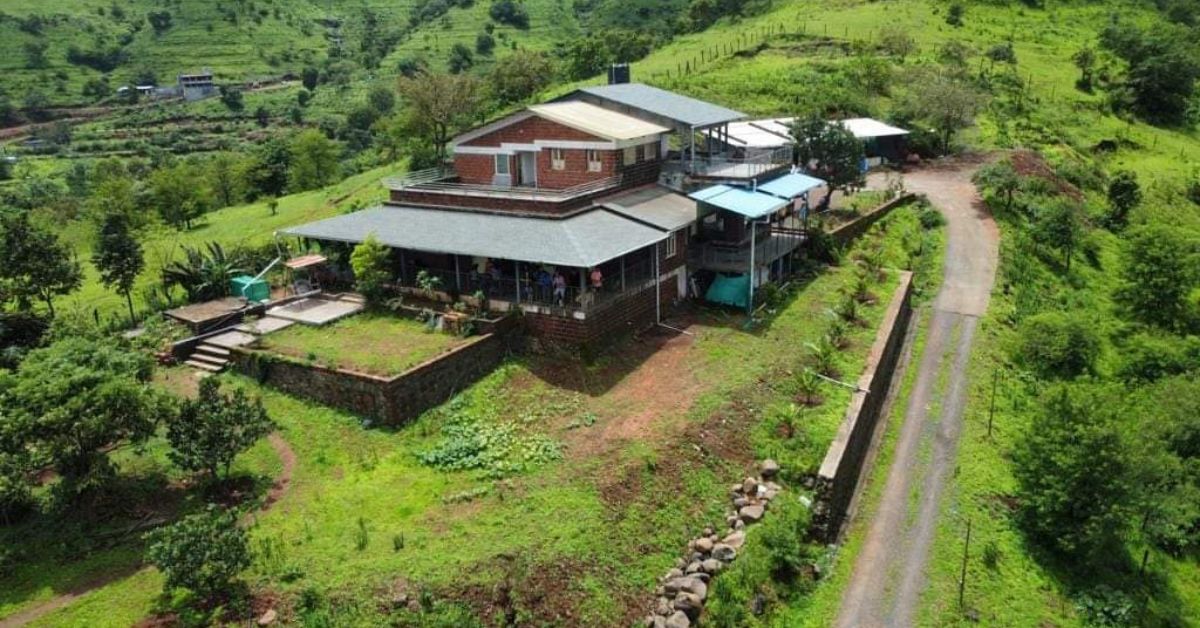
This longing led Anirudha and Sucheta to embark on a project to bring a piece of that rustic charm into their contemporary lives.
Their dream home, ‘Anant Farms’, is situated about 47 kilometres from Pune city. Set against the backdrop of historic forts like Torna and Rajgad, the farm offers breathtaking views and a tranquil environment. “The area is lush green during monsoon,” Anirudha shares, “It’s like a slice of Mahabaleshwar.”
Building a home with time-tested traditions
The architecture of Anant Farms is a homage to traditional construction techniques. The home spans 3,000 square feet, featuring a central courtyard — a nod to Anirudha’s ancestral home back in Bramhanghar.
This courtyard, capped with a transparent sheet to guard against heavy rains, is where family and friends gather, creating an inviting space for connection.
In an effort to preserve the rustic aesthetic, the couple sourced local and sustainable materials. Red stones from the Konkan region form the walls, naturally cooling the interior during summer and retaining warmth in winter. The floors are adorned with Jaisalmer stone tiles that lend a timeless elegance. “Because of these materials, our home remains up to four degrees cooler than the outside temperature,” he shares.
Perhaps the most remarkable facet of their home is the use of reclaimed materials. Antique teakwood doors and windows, once part of decades-old Pune houses slated for demolition, now breathe life into their home. They echo a bygone era with their intricate carvings and robustness.
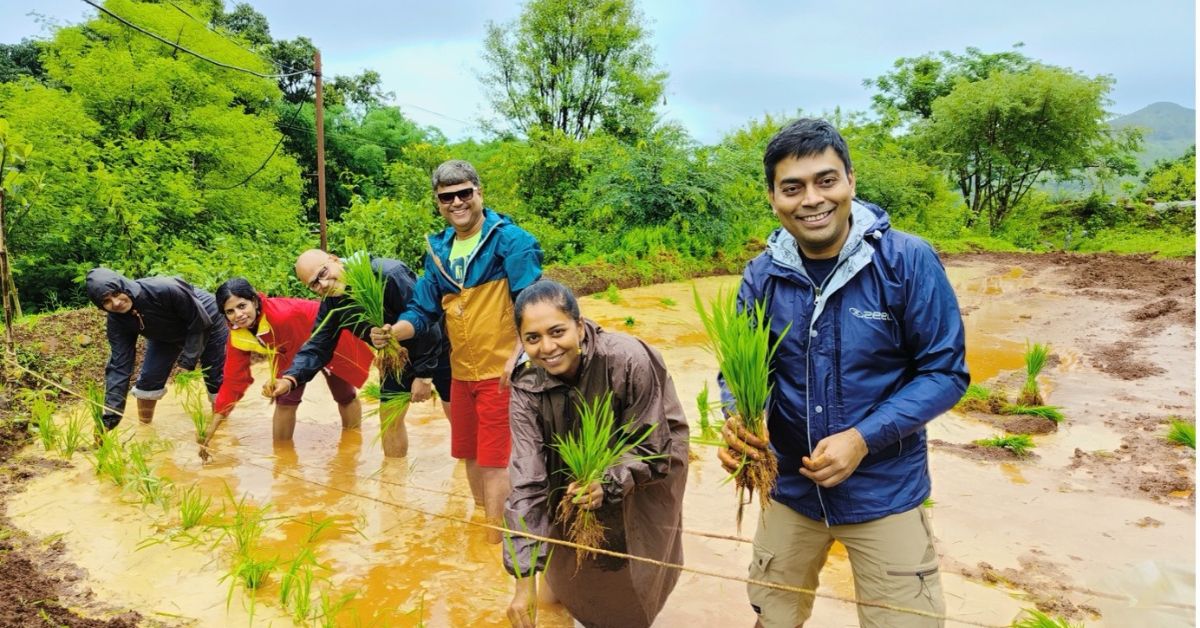
Complementing this charm are furniture pieces from Anirudha’s family home. “These are testaments of my grandfather’s legacy, which we tried to restore to their original glory,” adds the 47-year-old.
“We had a lot of teakwood furniture dating back to the 1950s that my grandfather purchased. He was a freedom fighter himself. From almirahs and doors to window frames and a giant jhula (swing), I brought everything to our home. Surprisingly, the furniture was in good shape despite being decades old. I only had to do some scraping and polishing. It still retains its heritage look and usability,” he shares.
While Anirudha took charge of the technical aspects, Sucheta focused on shaping the space into something that honoured their heritage. “From the very beginning, I wanted to create a home deeply rooted in the land’s essence. I decorated the interiors with folk art paintings and worked on integrating traditional elements into our modern sustainable design,” she adds.
Reducing power bills and saving water
Anirudha and Sucheta ensured that sustainability was at the heart of constructing their dream home. The house’s rainwater harvesting systems efficiently capture monsoon rains, filling a man-made pond that stores up to eight lakh litres of water. “This is sufficient for most of our water needs throughout the year,” Anirudha shares.
“We have a 20,000-litre water tank near our bungalow. Rainwater from our terrace is directed to the tank. This fulfils our water needs during the monsoon. After the monsoon, the pond water lasts us up to four months. Overall, rainwater fulfils 85 to 90 percent of our water needs,” he adds.
In addition, solar panels power their home, which reduces their reliance on electricity to a bare minimum. “Our electricity bill went from Rs 5,000 per month to just Rs 500 to 600, even with regular use of lights, fans, a refrigerator, and water heaters,” Anirudha proudly notes.
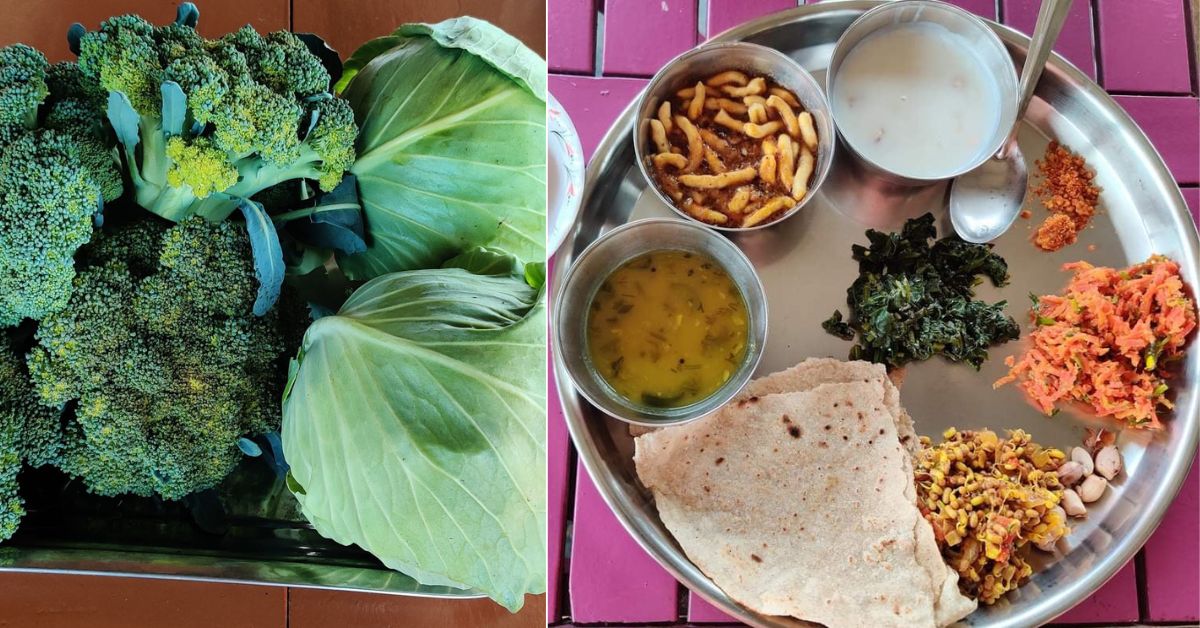
Interestingly, farm-to-table isn’t just a buzzword — it’s a way of life at their home. The couple cultivates a variety of fruits, vegetables, and spices. Except for potatoes and onions, they harvest about 12 varieties of vegetables including curry leaves, coriander, chillies, lime, tomatoes, cabbage, cauliflower, spinach, turmeric, garlic, and more.
Their house is surrounded by lush green fruit trees bearing custard apples, chikoo (sapodillas), mangoes, guavas, jamun (Indian blackberry), and papayas. “Each decision we made — from planting native trees to planning our organic farming layout — was guided by our vision of creating something meaningful for the community and environment around us,” she says.
At the time, Sucheta was new to organic farming, To deepen her understanding, she attended workshops on zero-budget farming and organic techniques.
The couple also keeps a cow, whose gentle mooing adds to the bucolic charm of the farm. “Its dung serves as a significant resource for organic compost like jivamrit that nourishes the soil,” shares Anirudha.
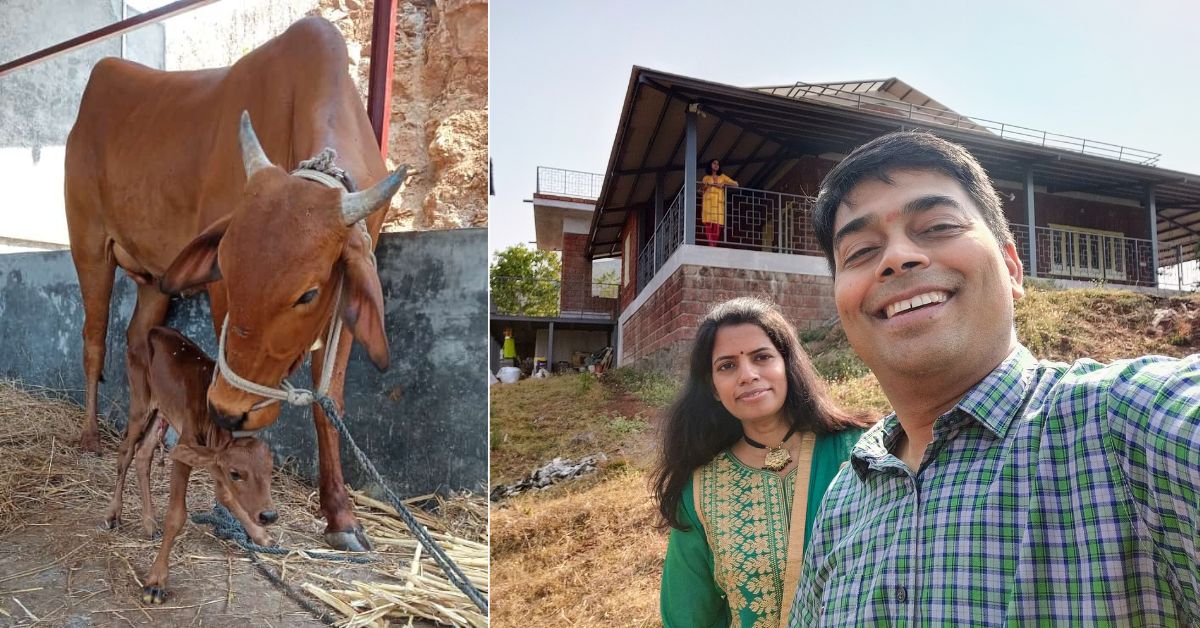
The couple frequently hosts guests at Anant Farms, which proves to be a rewarding experience. Visitors are greeted with a slice of sustainable life with organic meals and an immersive experience in nature. “Hosting guests here has been truly rewarding, as it allows us to create experiences that inspire others to embrace this mindful way of living,” Anirudha reflects.
Building this home was a journey filled with unexpected lessons and joys. “What began as a barren hill overlooking Torna Fort slowly transformed into a vibrant space. From sourcing natural materials to embracing the rural lifestyle, every step tested our patience. But this lifestyle has deepened my connection to our traditions,” shares Sucheta.
Experiencing farm life has been transformative for their family. “Watching our children develop a relationship with the land has been extraordinary. They now understand where their food comes from because they’re a part of the entire process — from sowing seeds to harvesting. Their excitement during harvest time and their pride in eating vegetables they helped grow make every challenge worthwhile,” she adds.
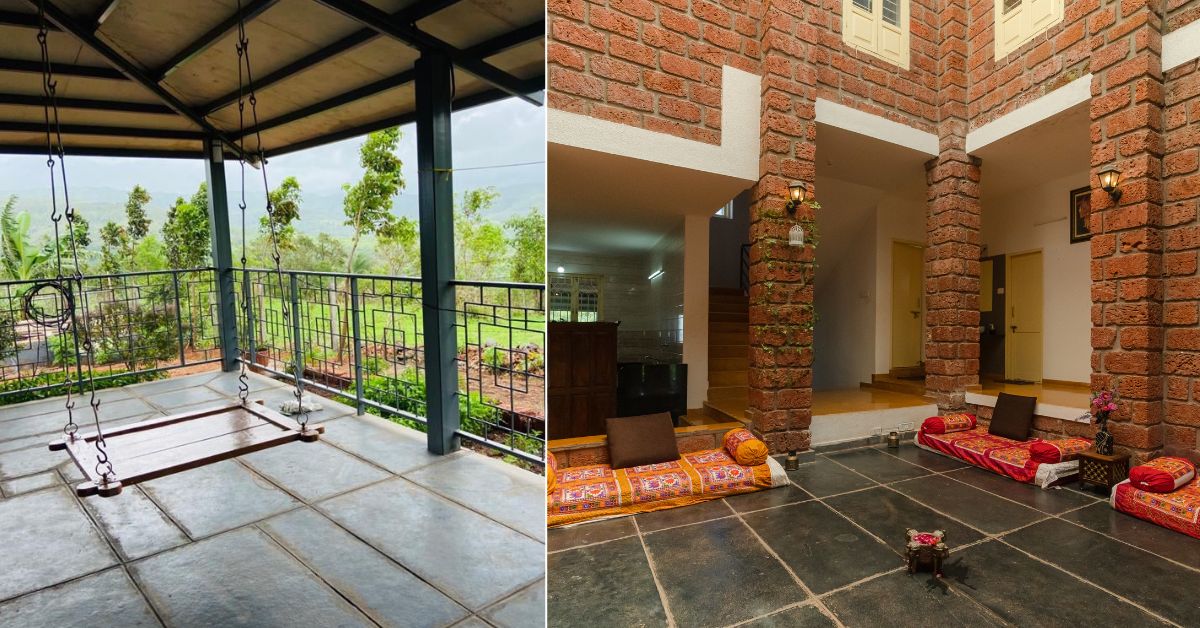
Meanwhile, Usha Ambekar, Anirudha’s mother, finds a sense of peace when visiting her son and daughter-in-law’s home. “The house is nestled in natural beauty — misty mountains, a tranquil little river, and lush greenery surround it. Every visit brings me joy and fills my heart with cherished memories,” she shares.
Usha and her husband always dreamed of having a small farmhouse in their village Gangakhed in Maharashtra’s Parbhani district. “Unfortunately, my husband passed away too soon, and we couldn’t fulfil this dream together. However, seeing this dream come to life through Anant Farms, created by our children, fills me with happiness and pride. They have lovingly kept his memory alive,” adds the 76-year-old.
Usha mentions that ‘Anant’ in ‘Anant Farms’ is a tribute to her late husband. “The fragrant Ananta tree planted by Sucheta reminds me of his presence. This farmhouse feels like a part of him, filled with the love and dreams we once shared,” she says.
With their experiences, Anirudha and Sucheta strive to promote a sustainable legacy. “We have tried to create a delicate balance between tradition and innovation, where the past whispers through the stone walls and the future is written in sustainable practices. For us, this isn’t just a home; it’s a sanctuary of memories and an inspiring blueprint for others to follow,” Anirudha notes.
Edited by Khushi Arora; All images courtesy Anirudha Ambekar.
No comments:
Post a Comment